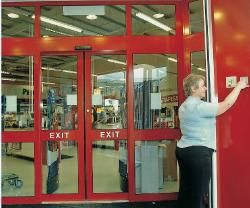Lighting is a Staples energy saver

The beginning and end of energy-efficient lighting — as staff arrive and leave Staples outlets equipped with Hager’s Tebis TS system they switch the lighting on and off, using a secure key switch.
An energy-saving lighting-control system for nearly 140 Staples retail outlets nationwide is being provided using Hager’s Tebis TS bus system. The system is also being used to control radiant heaters. When staff arrive, they turn on the lighting using a secure key switch, which turns on half the lighting. 10 minutes before the store is due to open. A timer switches on all lights in public areas. At the end of the day, half the lights in public areas are turned off 10 minutes after closing. The last person to leave turns off all the lighting using the master key switch. The system was installed by UK Electrical Installations, whose managing director Steve Fellows says, ‘Two building control systems were trialled for Staples before the contract was awarded. Working closely with the company, we specified the Tebis system because it offered simple installation and commissioning and enabled us to offer an easy energy-saving solution that the staff understand and involves minimal input from them.’ Installation involves a single twisted-pair bus around each store, so disruption is minimal, and a store can be refurbished in just two days. Input and output devices are simply tapped onto the Tebis cable using connects. Each device is assigned an address using a programmer, and then each input is programmed to switch certain output addresses. The system can be easily extended or reconfigured.
Related links:


